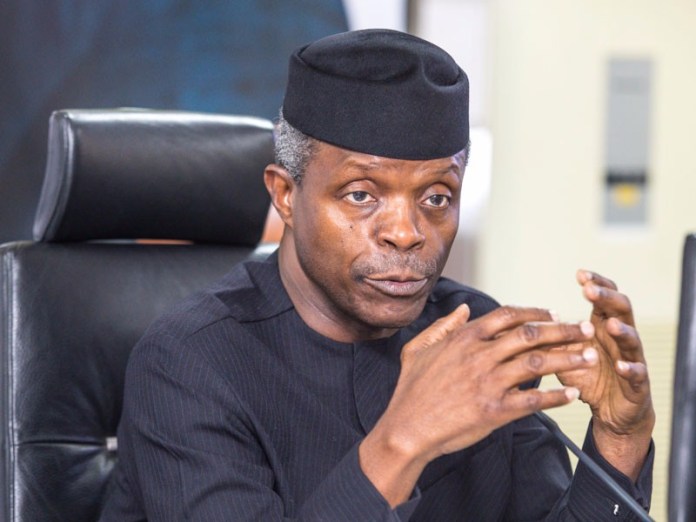- Nigeria Won’t Force African Peers to Adjust AfCFTA – Osinbajo
Vice-President Yemi Osinbajo has said the Federal Government will not force other African countries that have signed the African Continental Free Trade Area agreement to make adjustments to the framework.
Osinbajo stated this on Thursday in Lagos at the Financial Times Nigeria Summit in Lagos during a keynote interview with the Africa Editor, FT, Mr. David Pilling.
He said President Muhammadu Buhari did not sign the agreement in March because he wanted to satisfy the demands of the private sector.
The AfCFTA treaty is one of the flagship projects of the African Union Agenda 2063, and is aimed at creating a single continental market for goods and services, with free movement of business persons. On March 21, 2018, 44 African heads of state and government officials met in Kigali, Rwanda, to sign the framework to establish the AfCFTA.
Osinbajo said, “Many felt, as we went into the whole process, that sufficient consultations haven’t been done. Manufacturers’ association, in particular, and several others, felt that we shouldn’t go into this without further consultation, and they wanted to know exactly what the specifics will be in terms of the negotiations that will follow the signing of the framework.
“And it was the President’s opinion that it would be much wiser for us to suspend the signing until such a time as all these engagements are done to the satisfaction of the private sector.”
Asked if Nigeria would sign the agreement, the Vice President said, “I don’t think the question is whether we will not sign. I think what we will sign is probably the more important thing for us. What sort of negotiations will go on? Don’t forget that Nigeria is the largest market; so, we have more to lose.
“There are countries that are waiting for this big Nigerian market to open up. But we have to be a lot more careful. The question for us is: what will we sign? How will it play out for our private sector people?”
Asked if Nigeria would force the countries that had already sign the agreement to take another look at it and make some adjustments, the Vice President said, “No; that is not even correct. Let me explain how it works: First, there is a framework; then the actual negotiations, and the actual negotiations haven’t started. So, we are going to negotiate.
“For us, it is important to sit back and take a look at those negotiations first before heading even into the framework, which is really what we are doing at the moment. Where we are at is that we are looking at the nitty-gritty. Really, we are not saying we are going to negotiate the framework; the framework is already there.
“Our major concern is with the specifics, and those specifics have to be negotiated, and we are at a point where before we go into that, we will certainly make sure that we are happy with the terms and conditions.”
Osinbajo also said the Federal Government was working on the sale of joint venture oil assets in a bid to generate more funds.
The Federal Government said in its Economic Recovery and Growth Plan, a medium-term plan for 2017 to 2020, which was released last year, that it would reduce its stakes in the JV oil assets, refineries and other downstream subsidiaries such as pipelines and depots.
“We have been working on the whole question of sale of the JVs. As you can imagine, we are very involved in that process, and we certainly haven’t given up on it. We are working on it,” Osinbajo said in response to a question during the interview.
“I can tell you that a lot of work is going on and a lot of consultation is also going up, and we are also working with experts, because we see it as an important way of funding some of the other work that we intend to do, including improvement in the oil and gas sector.”
The nation’s oil and gas production structure is split between JV (onshore and in shallow waters) with foreign and local companies, and Production Sharing Contracts in deep water offshore.

 Forex3 weeks ago
Forex3 weeks ago


 Naira2 weeks ago
Naira2 weeks ago
 Billionaire Watch2 weeks ago
Billionaire Watch2 weeks ago




 Naira2 weeks ago
Naira2 weeks ago




 Naira4 weeks ago
Naira4 weeks ago




 Naira2 weeks ago
Naira2 weeks ago


 Naira7 days ago
Naira7 days ago
 Banking Sector4 weeks ago
Banking Sector4 weeks ago






















